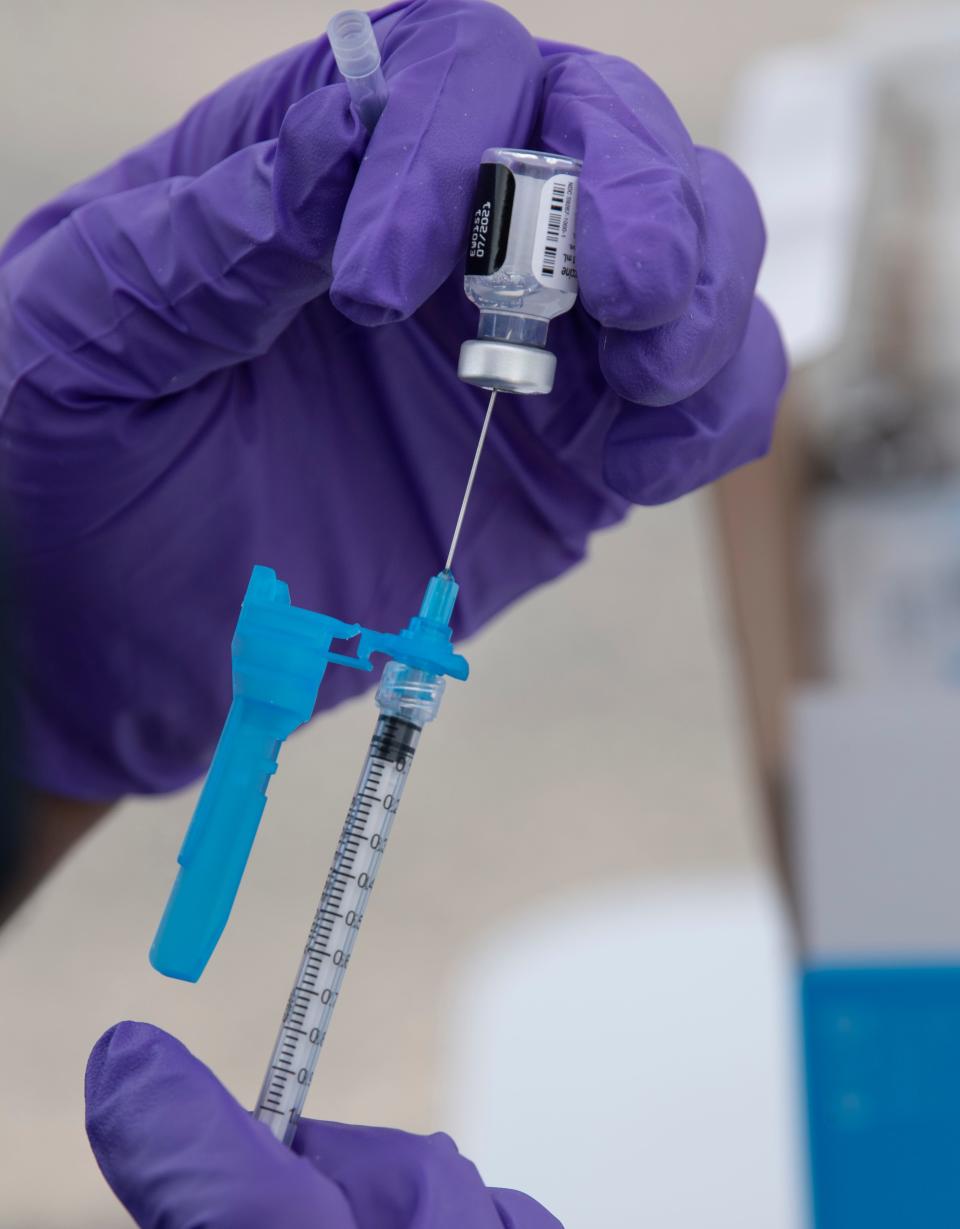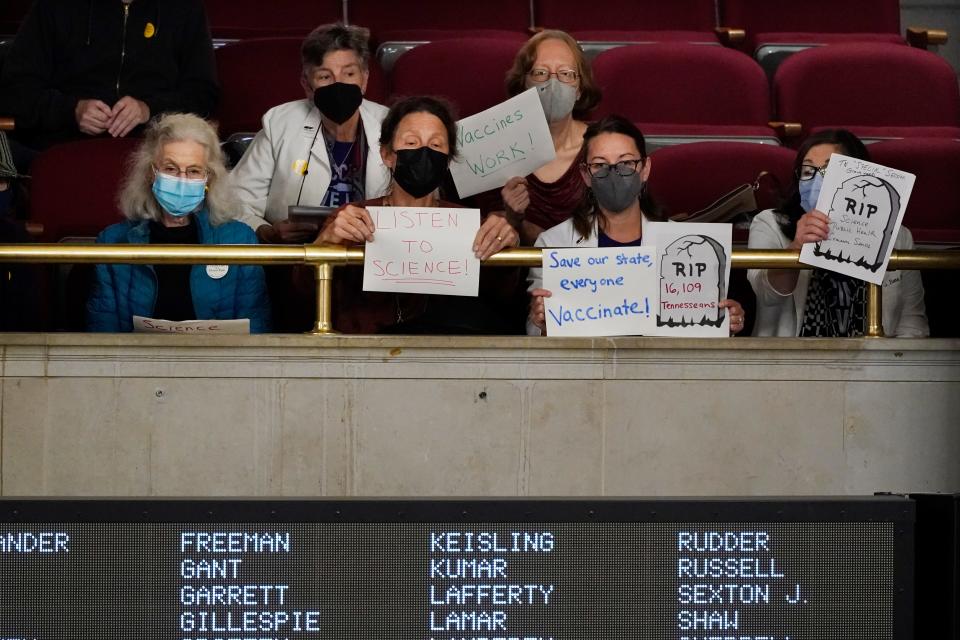Tennessee hospitals cannot require COVID vaccines as Biden mandate remains blocked
Editor's note: The story was updated on Dec. 3 at 9:45 a.m. to include comments from Gov. Bill Lee.
In late October, Tennessee lawmakers exempted hospitals from a sweeping ban on vaccine requirements with a catch: They could only mandate vaccines if required by federal rules.
But as President Joe Biden's vaccine mandate for large employers remains blocked in federal court, hospitals and other health care facilities — many of which fought to preserve their ability to require vaccines among employees — must now halt all such mandates.
Barring health care groups from requiring vaccines poses a significant public health risk that endangers patient safety, especially as omicron, a new variant of the coronavirus, is flaring up across the country, public health experts worry.
"I have major public health concerns if we are not going to mandate an evidence-based practice of vaccination," said Manoj Jain, an infectious disease expert in Memphis. "This will compromise patient safety, meaning that when patients are admitted to the hospital, they may not know if their caregiver is vaccinated or not."
The state ban on vaccine requirements, backed by the Republican Party, alarmed some GOP legislators. Sen. Richard Briggs, a Knoxville Republican and physician, said governments should not force any mandates upon businesses.
"What we did on our COVID special session (was) the government issued a bunch of mandates on what you can't do, and to me, that is an abridgement of the freedom of businesses to conduct their businesses," he said.
But Republican leaders, including Gov. Bill Lee and both speakers in the legislature, supported the state law as is.
"I just think that we have to respect the individual rights of people around medical decisions," Lee told reporters Friday.
Some hospitals pause vaccine mandates
Under the new state law, health care providers taking Medicare or Medicaid patients as well as federal contractors are exempt from Tennessee's vaccine mandate ban only if complying with the state law violates federal rules.
With the federal injunction in place, those entities — including private hospitals and medical professionals working in other health care settings — will subsequently lose the ability to mandate vaccines.
Some area hospitals are already dropping their mandates. HCA Healthcare, for example, told The Tennessean it is pausing its vaccine requirements "indefinitely."

Tennessee Hospital Association, which earlier this year expressed concerns about limiting hospitals' ability to require vaccines, is satisfied with the current state law tying that ability to now-blocked federal rules, which would have required hospitals to mandate vaccines as a condition to participate in Medicare and Medicaid, said group spokesperson Andrea Turner.
"THA supports the language that is currently included in the new state law," she said in an email.
Vanderbilt University Medical Center, which earlier this year required COVID-19 vaccination of all employees, is still "assessing the impact" of the injunction, said spokesperson John Howser. He did not directly answer if the hospital has paused the mandate after the injunction.
"We implemented a COVID vaccine requirement just as we have for other vaccine requirements to make our environment as safe as possible for our patients and employees," Howser said Thursday. "We are assessing the impact of the recent court order on our requirement."
State law sparks concerns about public health, government overreach
But taking away the ability of hospitals to mandate vaccines for health care workers could cripple public health during a deadly pandemic, Jain said. Hospitals already mandate several other vaccines, he pointed out. Additionally, the omicron variant could "cause a huge disruption" and result in "a large outbreak."
Some hospitals have encouraged their employees to receive the vaccines. But encouragement, instead of requirement, still allows a chance of spreading the virus inside hospital walls, Jain said.
"Even one person, unvaccinated, who then infects a patient or a colleague or others, that leads to unnecessary hospitalizations and deaths," he said. "We could very easily have a crisis on our hands with a number of outbreaks in hospital settings with a highly infectious variant if we do not take all of the available protections that we have to us."
Amy Gordon Bono, an internal medicine physician in Nashville, said vaccine requirements are "fiscally responsible public policy." Mandating vaccination in the medical field reduces the chance of infecting other health care workers, she said.

"As a worker in the healthcare field, I look at vaccination requirements as a way of helping create a safer work environment for my patients, my coworkers, and myself," she said in a text. "An ounce of prevention is worth a pound of cure. Caring for COVID is costly."
Stuck in between conflicting federal and state requirements, Briggs said it creates confusion for hospital workers as to which set of rules to follow.
Briggs, who was the only Republican senator to vote against the state law on COVID-19 restrictions, argued hospitals must balance patient safety and the need for workers during a labor shortage. But it should be hospitals' decision to make, he said, not the government's.

"When the government starts mandating you got to do something, or mandating you can't do something, it just creates chaos and confusion," he said.
Knoxville: University of Tennessee System drops mask mandate and vaccine requirements in latest twist
Lee argued Friday there should be no confusion for businesses over vaccine mandates. But the swift change in mandate authority led to quick reversals and reinstatements of policies for many entities, including the University of Tennessee System.
"There is no confusion right now because there is no mandate being manifest or that is required in the state," Lee said.
When asked if Lee believes it is wise to forbid hospitals from mandating COVID-19 vaccines, just as they have done for other vaccines, Lee said it should be the courts' decision to make. Firing the unvaccinated would hurt the workforce and exacerbate the labor shortage, which he said is a "counterproductive measure."
"I think the courts should and will decide what will happen with these COVID vaccine mandates," he said. "I think they are unnecessary."
Briggs also opposed allowing legislators to approve rules for the board of medical examiners to punish doctors spreading misinformation.
Additionally, he called the law "anti-Republican" for allowing the unvaccinated to collect unemployment benefits when they quit their job due to vaccine requirements or to sue their employers. Vaccination, just like dress codes or work hours, should be allowed as a condition of employment, he said.
"That was the most unRepublican thing," Briggs said. "In other words, when we have a workforce shortage, we are actually wanting to pay people to voluntarily give up their job and go on food stamps, welfare and unemployment."
Leaders in the legislature expressed unwillingness to budge. House Speaker Cameron Sexton, R-Crossville, said he sees no need to amend the current law.
"There is no need to amend state law as it relates to yesterday’s court ruling halting federal vaccine mandates," Sexton said.
Lt. Gov. Randy McNally, R-Oak Ridge, is open to changes but "supports the law as written," McNally spokesperson Adam Kleinheider said.
"Lt. Governor McNally is always open to making improvements, clarifications and technical adjustments to any legislation and has agreed to continue conversations with Governor Lee and Speaker Sexton about the legislation passed in the most recent special session," Kleinheider said in a statement. "That said, Lt. Governor McNally was the prime Senate sponsor of the COVID special session bills and he supports the law as written.”
Reach Yue Stella Yu at yyu@tennessean.com. Follow her on Twitter at @bystellayu_tnsn.
Want to read more stories like this? A subscription to one of our Tennessee publications gets you unlimited access to all the latest politics news, podcasts like Grand Divisions, plus newsletters, a personalized mobile experience and the ability to tap into stories, photos and videos from throughout the USA TODAY Network's daily sites.
This article originally appeared on Nashville Tennessean: Tennessee hospitals can't require COVID vaccines, Biden mandate blocked
